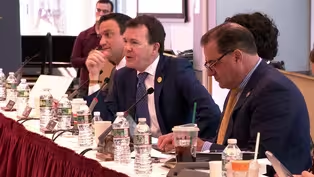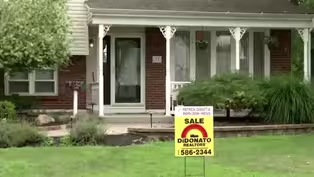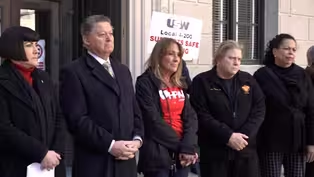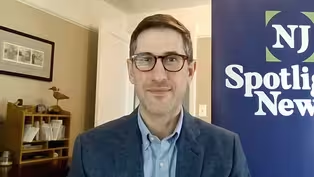NJ Spotlight News
Warning about critical threshold for global warming
Clip: 3/21/2023 | 5m 49sVideo has Closed Captions
Robert Kopp of Rutgers University discusses UN report, cutting global emissions
Global warming is driving intense changes in Earth's climate, but the international community has for decades dragged its feet on reducing the greenhouse gas emissions that are fueling the problem. Now the planet is on track within 10 years to cross a critical threshold that would undercut the global goal of limiting warming to 1.5 degrees C, according to a new U.N. report.
Problems playing video? | Closed Captioning Feedback
Problems playing video? | Closed Captioning Feedback
NJ Spotlight News is a local public television program presented by THIRTEEN PBS
NJ Spotlight News
Warning about critical threshold for global warming
Clip: 3/21/2023 | 5m 49sVideo has Closed Captions
Global warming is driving intense changes in Earth's climate, but the international community has for decades dragged its feet on reducing the greenhouse gas emissions that are fueling the problem. Now the planet is on track within 10 years to cross a critical threshold that would undercut the global goal of limiting warming to 1.5 degrees C, according to a new U.N. report.
Problems playing video? | Closed Captioning Feedback
How to Watch NJ Spotlight News
NJ Spotlight News is available to stream on pbs.org and the free PBS App, available on iPhone, Apple TV, Android TV, Android smartphones, Amazon Fire TV, Amazon Fire Tablet, Roku, Samsung Smart TV, and Vizio.
Providing Support for PBS.org
Learn Moreabout PBS online sponsorshipthe message is simple but Stark time is running out to save the planet the latest climate change report released by the U.N late yesterday showed that Earth is on track to reach a critical threshold that will lead to dangerous overheating with catastrophic results in the next decade but all hope is not lost according to scientists if countries are willing to make immediate and drastic shifts away from fossil fuels for our ongoing series Peril and promise examining the human impact of climate change I'm joined Now by Bob Kopp a sea level rise professor at Rutgers University and a contributing author to that un report Bob thanks so much for being with us today I've got to say the message feels dire the Earth is in trouble what will be the global impacts if collectively Nations don't change course well right now we are on track for exceeding the one and a half degrees Celsius Target set out in the Paris agreement and by the middle of the next decade or so and so in order to avoid overshooting that Target by too much we need to be on a trajectory that gets our emissions rapidly to zero if we actually wanted to stay below that Target um which has been set out as a goal we would need to get our global net carbon dioxide emissions to Zero by around the middle of the century um and have roughly 50 reductions uh by the end of this decade that's very ambitious now one and a half degrees C is not a cliff every increment of warming makes things a little worse it makes heat waves more severe it makes sea level rise a little faster um and makes the challenges we all face particularly um people with lower income and people who have contributed less the problem makes those challenges more severe um so every increment we can do to prevent the uh the ultimate magnitude of ride to lower that ultimate magnitude of Rise helps a little bit the UN report really recommends shifting away from fossil fuels in a in a dramatic way what should that look like well you know what the report says that if you is that if you look at the scenarios consistent with the targets that the nation of the world agreed that means you know the more stringent Target set out on the Paris agreement one and a half degrees Celsius that would mean something like Net Zero Global emissions of carbon dioxide by the 2050s the less stringent Target about two degrees Celsius that would be Net Zero by about the 2070s so either way it would mean getting emissions onto a downward trajectory very rapidly the report also says that shifting to a low carbon economy would require about three to six times more investment than what we've already invested in green energy just in terms of dollars what does that mean here in the US and can we afford it well the question is what can't we afford um right in many cases in fact these are investments uh that save us uh money in the long run um both not just because we're avoiding the impacts of climate change because also actually um if you look uh at the world today things like solar energy tend to be the cheapest source of energy so a lot of the these um Technologies I think where we spend money up front to save money in the long run now the transition is not free it requires it will require spending money but continuing to invest in fossil fuels continuing to dump carbon dioxide into the atmosphere these all also bear substantial costs um and so you know the the um from an economic perspective it's a trade-off between you know spending a little money now to get things that are you know in some cases directly benefiting our health so the report talks about how the air pollution reduction benefits of transitioning fossil fuels would practically be enough to say for hey for a lot of the transition itself um as well as the benefits of not continuing to turn up the planetary thermostat you mentioned who is impacted and the issue of climate Justice does come up in this report you mentioned it's often folks who who didn't contribute who is most impacted by these Rising temperatures yeah so it depends on what impact you're looking at but the general pattern is pretty clear the most severe impacts of climate change tend to fall upon people who are in hotter parts of the world and from people who have fewer resources um right so we've done work in my group and collaborators on the global Health impacts of climate change and there you have a very clear pattern where you know the low-income countries tend to be hotter and they get the most severe effects um you know people up in Scandinavia might actually get some health benefits from a slightly warmer climate but it's the the people in Europe and North America and increasingly in China who are contributing the most to the problem not necessarily the complacent people getting the most harm from it absolutely Bob Kopp thank you so much for your expertise here my pleasure lead funding for parallel and promise is provided by Dr p Roy vagalos and Diana T vagalos major support is provided by the Marc Haas foundation and Sue and Edgar Wachenheim III and the Cheryl and Philip milstein family [Music] thank you [Music]
DeCamp to end commuter bus service to NYC
Video has Closed Captions
Clip: 3/21/2023 | 56s | Large drop in ridership during pandemic makes service unsustainable, company says (56s)
First budget hearing marked by calls for extra funding
Video has Closed Captions
Clip: 3/21/2023 | 4m 25s | The hearing included an animated discussion about school funding (4m 25s)
First-time homebuyers face high prices and interest rates
Video has Closed Captions
Clip: 3/21/2023 | 4m 5s | Last year, only 26% of U.S. homes sold went to first-time buyers (4m 5s)
Nurses urge passage of bill on nurse-to-patient ratios
Video has Closed Captions
Clip: 3/21/2023 | 4m 40s | Not everyone agrees a mandated ratio is the answer to staff shortages (4m 40s)
Video has Closed Captions
Clip: 3/21/2023 | 4m 21s | NJSN reporter John Reitmeyer talks about NJ's budget process and a new school aid bill (4m 21s)
Providing Support for PBS.org
Learn Moreabout PBS online sponsorshipSupport for PBS provided by:
NJ Spotlight News is a local public television program presented by THIRTEEN PBS















